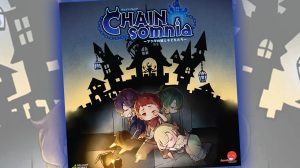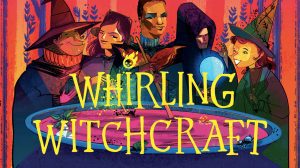In CHAINsomnia, a.k.a. ãƒã‚§ã‚¤ãƒ³ã‚½ãƒ ニア, sleeping children become trapped in the castle of the demon Akuma and must work with others to escape. If any player is on the "wake up" tile when all "bad dream" cards are removed, they escape and win the game; if all the characters are immobilized by chains or the event cards are exhausted without anyone waking up, then everyone is defeated.
In more detail, you and each other player take a character card and cover two of the six spaces on its "chain gauge". The highest uncovered number on this gauge shows how many action points (AP) you have available on your turn, and each character has a unique skill, in addition to values for strength, wisdom, and luck. All characters start on the central tile, with the "wake up" tile being placed at the bottom of the room tile deck. On a turn, you use your AP to take actions from the following list, repeating actions as desired:
Add a new room tile to the playing area, matching doors and walls on all tiles; draw and resolve an event card, with a "bad dream" being placed on this card.
Move to an adjacent tile.
Search a "secret spot" on a tile, drawing an item card if you make a wisdom check.
Use a consumable (one-time) item card. (Equippable item cards can be used repeatedly and cost 0 AP.)
Give an item to another character on the same tile as you or on an adjacent tile.
Give chains to or take chains from another character on the same tile as you or on an adjacent tile.
Use your personal skill (if it has an AP cost).
As chains are added to or removed from your character card, your AP count might change. If all six spaces on your chain gauge are covered, you're immobilized and can spend no AP on your turn. If a "bad dream" is placed in a room, no character can enter that room, although you might be able to remove it through various skills, items, or events; if a "Bad dream" ends up in your room, then you're trapped in that dream and cannot move until you or someone else can dissolve that dream.
After all players take their actions, the demon acts, initially with only one event card, but as the game progresses and shrieks are added to the table, more event cards are drawn for each demon turn.
If all the bad dreams have been vanquished and a player is on the "wake up" tile — which will be drawn only after sixteen room tiles in a game of normal difficulty — then you all win, with everyone awakening from the demon's clutches. Otherwise you will sleep forever...
•••
アクマ城ã«æ•ã‚‰ã‚ã‚ŒãŸåã©ã‚‚ãŸã¡ã¨ãªã£ã¦ã€ä»–ã®äººãŸã¡ã¨å”力ã—ã¦æ怖を乗り越ãˆã¦è„±å‡ºã‚’目指ã™ãƒœãƒ¼ãƒ‰ã‚²ãƒ¼ãƒ 。
悪夢カードを全ã¦å–り除ã„ãŸçŠ¶æ…‹ã§ã„ãšã‚Œã‹ï¼‘人ãŒWakeupタイルã®ä¸Šã«ã„ãŸã‚‰ã€ã‚²ãƒ¼ãƒ 終了ã§ã™ã€‚ãã®å ´åˆã¯ã€å…¨å“¡ã®å‹åˆ©ã§ã™ã€‚
全員ãŒé³¥ã‹ã”ã«æ•ã‚‰ã‚ã‚Œã¦ã—ã¾ã†ã‹ã€ã‚¤ãƒ™ãƒ³ãƒˆã‚«ãƒ¼ãƒ‰ãŒå¼•ã‘ãªããªã£ã¦ã‚‚ã€ã‚²ãƒ¼ãƒ 終了ã§ã™ã€‚ãã®å ´åˆã¯ã€å…¨å“¡ã®æ•—北ã§ã™ã€‚
What if Betrayal at House on the Hill was fully cooperative? You get CHAINsomnia.











